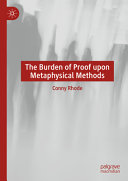

Most ebook files are in PDF format, so you can easily read them using various software such as Foxit Reader or directly on the Google Chrome browser.
Some ebook files are released by publishers in other formats such as .awz, .mobi, .epub, .fb2, etc. You may need to install specific software to read these formats on mobile/PC, such as Calibre.
Please read the tutorial at this link: https://ebookbell.com/faq
We offer FREE conversion to the popular formats you request; however, this may take some time. Therefore, right after payment, please email us, and we will try to provide the service as quickly as possible.
For some exceptional file formats or broken links (if any), please refrain from opening any disputes. Instead, email us first, and we will try to assist within a maximum of 6 hours.
EbookBell Team

5.0
30 reviewsWho carries the burden of proof in analytic philosophical debates, and how can this burden be satisfied? As it turns out, the answer to this joint question yields a fundamental challenge to the very conduct of metaphysics in analytic philosophy.
Empirical research presented in this book indicates that the vastly predominant goal pursued in analytic philosophical dialogues lies not in discovering truths or generating knowledge, but merely in prevailing over one’s opponents. Given this goal, the book examines how most effectively to allocate and discharge the burden of proof. It focuses on premises that must prudently be avoided because a burden of proof on them could never be satisfied, and in particular discusses unsupportable bridge premises across inference barriers, like Hume’s barrier between ‘is’ and ‘ought’, or the barrier between the content of our talk or thought, and the world beyond such content.
Employing this content/world barrier for a critical assessment of mainstream analytic philosophical methods, this book argues that we must prudently avoid invoking intuitions or other content of thought or talk in support of claims about the world beyond content, that is, metaphysically significant claims. Yet as content-located evidence is practically indispensable to metaphysical debates throughout analytic philosophy, from ethics to the philosophy of mathematics, this book reaches the startling conclusion that all such metaphysical debates must, prudently, be terminated.